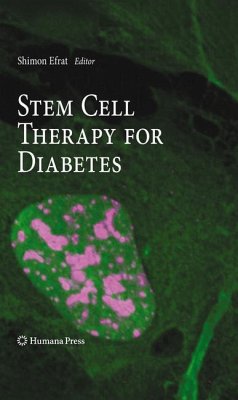
Stem Cell Therapy for Diabetes

PAYBACK Punkte
57 °P sammeln!
Stem Cell Therapy for Diabetes, one of the latest installments of the Stem Cell Biology and Regenerative Medicine series, reviews the three main approaches for generation of sufficient numbers of insulin-producing cells for restoration of an adequate beta-cell mass: beta-cell expansion, stem-cell differentiation, and nuclear reprogramming. Adeptly collecting the research of the leading scientists in the field, Stem Cell Therapy for Diabetes compares the merits of employing autologous versus banked allogeneic cell sources for generation of surrogate beta cells, and addresses tissue engineering ...
Stem Cell Therapy for Diabetes, one of the latest installments of the Stem Cell Biology and Regenerative Medicine series, reviews the three main approaches for generation of sufficient numbers of insulin-producing cells for restoration of an adequate beta-cell mass: beta-cell expansion, stem-cell differentiation, and nuclear reprogramming. Adeptly collecting the research of the leading scientists in the field, Stem Cell Therapy for Diabetes compares the merits of employing autologous versus banked allogeneic cell sources for generation of surrogate beta cells, and addresses tissue engineering and ways for cell protection from recurring autoimmunity and graft rejection. Stem Cell Therapy for Diabetes provides essential reading for those especially interested in tracking the progress in applying of one of the most exciting new developments in bio-medicine towards a cure for diabetes.














